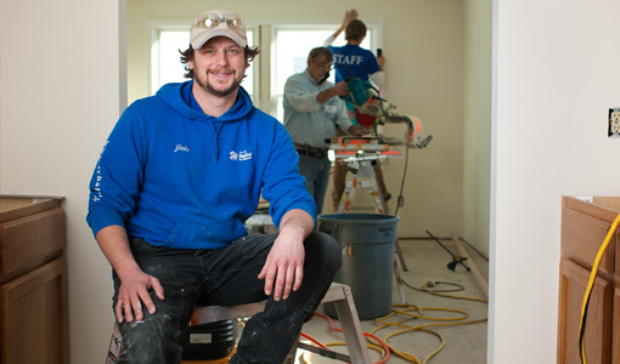Jake Kirchgessner, senior site supervisor with Twin Cities Habitat for Humanity, was being prepared for his career long before he was even thinking of a job. Both of his grandfathers were men who could “take care of anything around the house.” His maternal grandpa was an engineer. “He could tell you how something was made and how well it was made,” Kirchgessner says. His paternal grandpa was a general contractor. “I rode around in his truck with him to sites.” Both were intelligent, hardworking men.
Kirchgessner first worked for Habitat for Humanity as a volunteer in high school, and he continued his volunteer work in college, participating in a VISION trip that was focused on Habitat work in Mississippi. After graduation, he joined AmeriCorps, dedicating two years to work at Twin Cities Habitat for Humanity. From there, he moved into custom construction and landscaping. He had the opportunity to work on projects that used the skills he had developed and yet were very different from the jobs he had previously done. The work was good, but, Kirchgessner says, “I missed the social justice aspect.” When a position opened up within Twin Cities Habitat for Humanity in 2005, he applied and got the job.
As a senior site supervisor, Kirchgessner starts his part of the work on a project when he meets with the project manager and they work together on the budget, seeing if enough money has been donated to match the anticipated costs. Once a solid budget is established, they create a timetable, which must include the close date and the availability of subcontractors and volunteers. When both budget and timetable are in place, he works with subcontractors to get the initial work done to prepare a safe site for volunteers to work on.
Kirchgessner says he uses his business education every day in his work with volunteers. “I have to teach, make sure they are safe and make sure we accomplish a lot and have a great day. I manage up to 40 people a day. I need to figure out where they will all fit in by lunch.” Each day starts with a safety speech, including information on the proper handling of tools. In some cases, volunteers never have swung a hammer. Kirchgessner breaks the volunteers into groups and mentors people along the way, trying to figure out early on what his volunteers know and what he needs to teach them. “The process doesn’t change much,” he says. “The people do.” Kirchgessner is usually the only supervisor for the site, but he has assistance from an AmeriCorps service member.
Homeowners are key members of his team, since they must contribute between 300 and 500 hours of labor on the construction of their home. For Kirchgessner, these homeowners are the reason he works. “I want to keep getting families into safe, decent, affordable homes,” he says. “I enjoy what I’m doing. I’ve always believed that if I don’t enjoy my work, I need to get out of it.”
Kirchgessner has great admiration for the volunteers he works with. “Some of the people who volunteer with Habitat for Humanity might come here on Tuesday and Wednesday and volunteer at the food shelf on Thursday,” he says. As he anticipates becoming a father, he doesn’t expect to have time for that kind of dedicated volunteerism, but he looks forward to someday emulating the volunteers on his team.
Kirchgessner does make time for reading, especially nonfiction books on global conditions, such as Stones Into Schools or Half the Sky. “The stories can be sad, but then I realize that people are going through similar things right down the street. There are lots of problems elsewhere, but we have lots to fix here.” He’s happy to grab a hammer and unite a team of volunteers to make that happen.
About Twin Cities Habitat for Humanity Twin Cities Habitat for Humanity is best known for its homeownership program, designed to make decent, affordable shelter available for all people. In addition, TCHFH has programs such as A Brush with Kindness, which help preserve homeownership among low income families. Their work can include construction in established neighborhoods in St. Paul and Minneapolis, but it also can include multiunit construction in new suburban neighborhoods. When Kirchgessner began one project in Oakdale, there was no road. “When I left, the development was being filled in.” But for Kirchgessner, the most exciting thing about his work is the dedication of families, volunteers and staff. “The guys I’m working with right now are retired and volunteer 100+ days a year. It’s individuals like that who make this a success.”
Read more from B. Magazine





